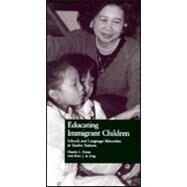Educating Immigrant Children: Schools and Language Minorities in Twelve Nations
, by Glenn,Charles L.- ISBN: 9780815314691 | 0815314698
- Cover: Hardcover
- Copyright: 8/1/1996
In the United States and in various nations throughout the world, immigrants seeking temporary or permanent residence are increasing in numbers. This comparative study surveys the educational policies and practices in response to language diversity in a dozen nations, and draws from them lessons for a more effective "whole-school" approach. Policies and practices are discussed in the context of political debate within the minority communities and in the wider society of each nation; the competing claims of integration and of language and cultural maintenance are taking widely differing forms in the nations studied and among the various minority communities. Perspectives from sociology, cultural anthropology, sociolinguistics, political science, and research on school effectiveness are brought to bear. Some of the groups included are: Turks, Moroccans and Algerians, refugees from the former Yugoslavia, various nationalities of Spanish speakers, Greeks, Italians, Haitians, Surinamese and Jamaicans,Indians, Pakistanis, Bangladeshis and Sri Lankans, Vietnamese and Cambodians. Nations emphasized are those of Western Europe, the United Kingdom, and the United States. The concern is with children who are marked both by the linguistic and cultural differences between their homes and schools, and by the low status of their parents and their ethnic identities in the host society. Chapters explore principal controversies; the current status of immigration to the OECD nations; indigenous language minority groups; the complex relationships immigrants develop with host societies, homelands, and ethnic communities; maintenance or abandonment of native language; programs, classroom practices, and policy implications.






